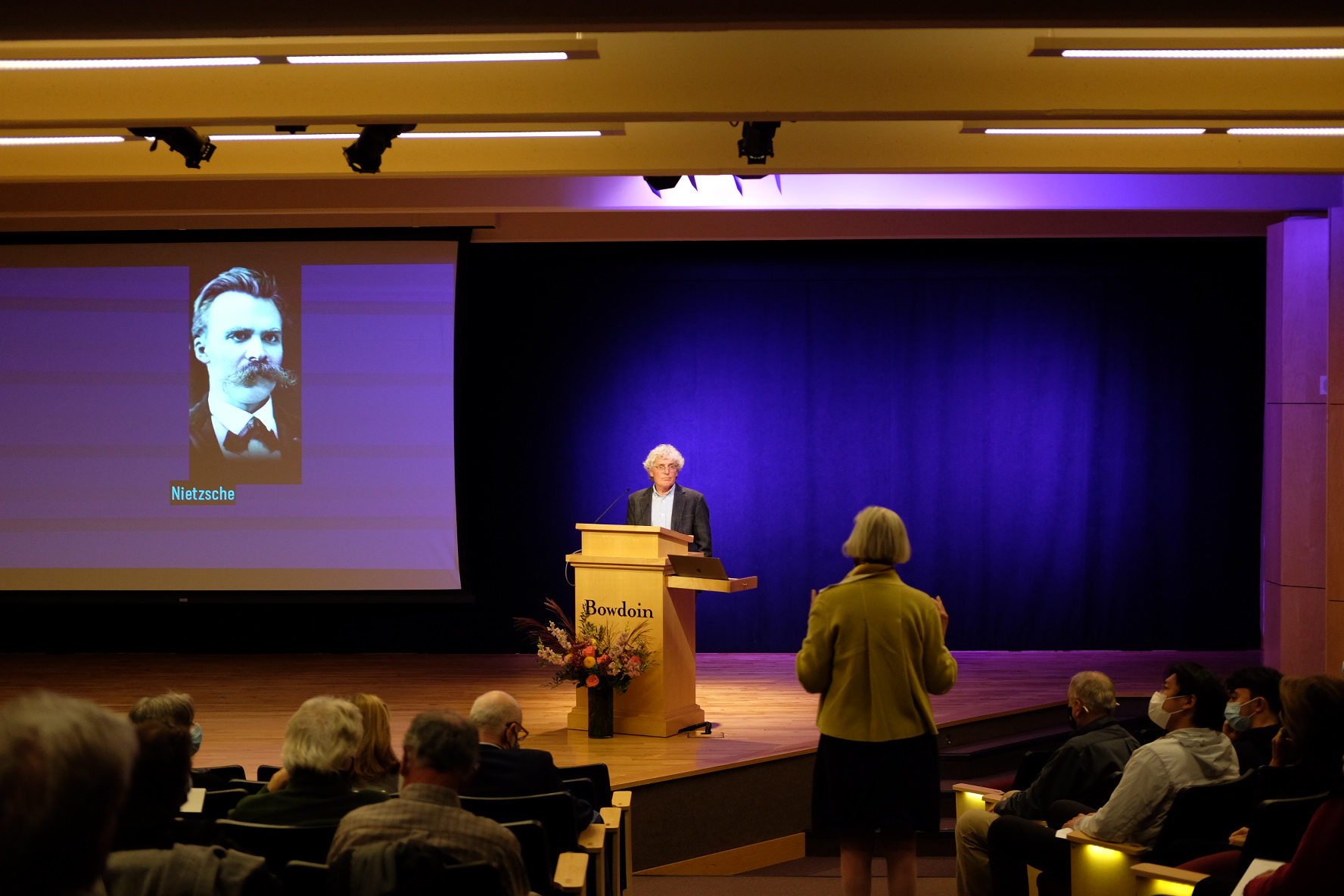Franco previews new book in inaugural lecture
October 22, 2021
 Diego Lasarte
Diego Lasarte“[Liberalism’s] weak spot has always been the kind of human being it promoted: one that is preoccupied with comfortable self-preservation, driven by calculation of self-interest, rather than by imagination and lofty goals,” Barry N. Wish Professor of Government Paul Franco said early in the inaugural lecture for his new, endowed position.
This critique of what enlightenment-era liberalism has wrought worked as the common thread tying the philosophies of Jean-Jacques Rousseau and Friedrich Nietzsche in Franco’s lecture, as well as in his recent book “Rousseau, Nietzsche, and the Image of the Human.” A lively event for a Tuesday night in Kresge Auditorium, the lecture was attended by President Rose, dozens of Franco’s former and current students and many of his colleagues from across the faculty.
Franco began his lecture with a broad overview of the two subjects of his book, explaining the areas of study where Rousseau and Nietzsche’s ideas came together as well as, oftentimes, clashed in their diagnosis of modernity. While Rousseau lamented rising inequality, and the erosion of civic life it caused, Nietzsche criticized an over-emphasis on democratic values, arguing it contributed to the decline of individualism.
The main focus of Franco’s work, however, is where their sharp critiques of modern life came together.
“As I have indicated, it is precisely this moral and cultural deficit of modern enlightenment liberalism that is the object of Rousseau and Nietzsche’s critiques,” said Franco.
Perhaps the main question left lingering at the end of Franco’s remarks was brought up by Gary M. Pendy Sr. Professor of Social Sciences Jean Yarbrough in the Q&A portion of the lecture, namely how Franco planned to reconcile Nietzsche’s critique of modernity with his dogmatic anti-democratic stance.
Yarbrough, who admitted her common ground with Nietzsche in regards to his mistrust for democracy, argued that Franco, in highlighting Nietzsche’s writings on modern life, was attempting to rehabilitate Nietzsche for consumption within a liberal democracy—a situation she did not see as tenable.
“I have a great deal of sympathy with Nietzsche’s criticism of democratic culture… but I don’t see how you can somehow try to save Nietzsche for a democratic society,” said Yarbrough. “You want somehow to separate the culture from the politics, and hold out some hope, but what really would that [world] look like?”
In response, Franco reiterated his belief that it is important to take into account the larger context of Nietzsche’s writings. In doing so, it is possible to still admit a level of discomfort with Nietzsche’s ideas about the necessity of an aristocracy.
“I actually do think that Nietzsche has this idea that aristocracy can coexist with democracy … that even if [aristocrats] don’t rule [over society], they set the tone for society … [however], I do think there is something sociologically very problematic about that.”
Max Freeman ’22, a student of both Franco and Yarbrough as well as one of the leaders of the Peucinian Society, saw the question as indicative of a larger political tension essential to understanding Franco’s work.
“I think the exchange between Professor Franco and Professor Yarbrough showed us just how difficult it is to harmonize the presence and pursuit of greatness with the values of democracy,” Freeman said.
Associate Professor of Government Jeffrey Selinger also brought up a lingering observation during the Q&A, noting that Franco was the only Nietzsche scholar he had encountered who did not chain smoke or wear black boots.
“Somehow, because of your brown shoes, you still harbor a deep-seated commitment to liberal democracy,” Selinger said at the conclusion of the lecture.
“I actually tried to start smoking many times, but it never took.” Franco responded.
Comments
Before submitting a comment, please review our comment policy. Some key points from the policy:
- No hate speech, profanity, disrespectful or threatening comments.
- No personal attacks on reporters.
- Comments must be under 200 words.
- You are strongly encouraged to use a real name or identifier ("Class of '92").
- Any comments made with an email address that does not belong to you will get removed.

Nice article and with an interesting caption title under the photo.